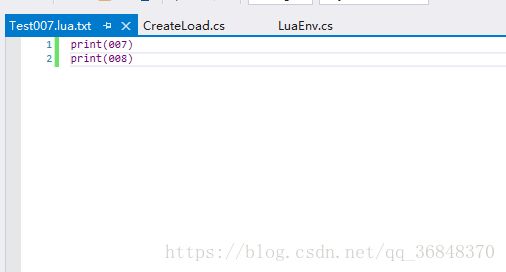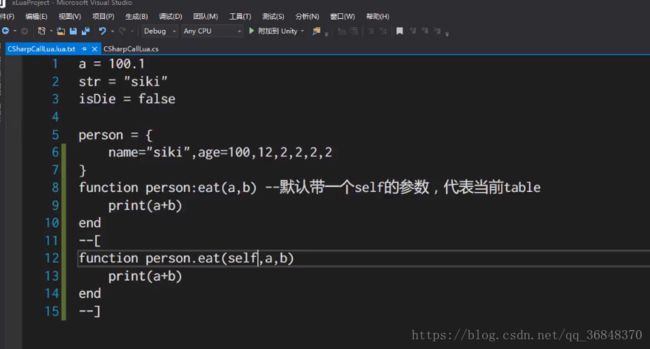Unity XLua 官方教程学习
一、Lua 文件加载
1. 执行字符串
using UnityEngine;
using XLua;
public class ByString : MonoBehaviour {
XLua.LuaEnv luaEnv ;
// Use this for initialization
void Start () {
luaEnv = new XLua.LuaEnv();
//从Unity调用Lua
// luaEnv.DoString("print('HelloWorld')");
//从unity调用Lua,Lua调用C#
luaEnv.DoString("CS.UnityEngine.Debug.Log('HelloWorld')");
}
// Update is called once per frame
void Update () {
if (luaEnv!=null)
{
// 清楚 Lua 未手动释放的 LuaBase 对象
luaEnv.Tick();
}
}
private void OnDestroy()
{
luaEnv.Dispose();
}
}2. 加载 Lua 文件
using System.Collections;
using System.Collections.Generic;
using UnityEngine;
public class HelloWorldByFile : MonoBehaviour {
XLua.LuaEnv luaEnv = null;
void Start () {
TextAsset ta = Resources.Load("HelloWorld.lua");
luaEnv = new XLua.LuaEnv();
luaEnv.DoString(ta.bytes);
//或者用下面的方法
// luaEnv.DoString("require 'HelloWorld'"); //requite 会Load 找到 HelloWorld.Lua.Txt require实际上是调一个个的loader去加载,有一个成功就不再往下尝试,全失败则报文件找不到。
}
// Update is called once per frame
void Update () {
}
private void OnDestroy()
{
luaEnv.Dispose();
}
}
其中 Lua 文件代码为:
print("Hello Lua")
print("Hello Lua")
print("Hello Lua")
print("Hello Lua")
a=2
b=3
print(a+b)需要注意的是因为 Resource 只支持有限的后缀,放 Resources 下 lua 文件得加上 txt 后缀,如:HelloWorld.lua.txt。
3. 自定义 Loader
using System.Collections;
using System.Collections.Generic;
using UnityEngine;
public class CreateLoad : MonoBehaviour {
public delegate byte[] CustomLoader(ref string filepath);
// public void LuaEnv.AddLoader(CustomLoader loader)
XLua.LuaEnv luaEnv;
private byte[] MyLoader(ref string filePath)
{
print(filePath);
string s = " a=5 b=10 print(a+b)";
return System.Text.Encoding.UTF8.GetBytes(s);
}
void Start () {
luaEnv = new XLua.LuaEnv();
luaEnv.AddLoader(MyLoader);
luaEnv.AddLoader(MyLoader);
luaEnv.DoString("require 'xxx'");
}
private void OnDestroy()
{
luaEnv.Dispose();
}
}
自定义loader路径
using System.Collections;
using System.Collections.Generic;
using UnityEngine;
using System.IO;
public class CreateLoad : MonoBehaviour {
public delegate byte[] CustomLoader(ref string filepath);
// public void LuaEnv.AddLoader(CustomLoader loader)
XLua.LuaEnv luaEnv;
void Start () {
luaEnv = new XLua.LuaEnv();
luaEnv.AddLoader(MyLoader);
luaEnv.DoString("require 'Test007'");
}
private void OnDestroy()
{
luaEnv.Dispose();
}
private byte[] MyLoader(ref string filePath)
{
string absPath = Application.streamingAssetsPath + "/" + filePath + ".lua.txt";
string s= File.ReadAllText(absPath);
return System.Text.Encoding.UTF8.GetBytes(s);
}
}
C#访问Lua
方法1:通过Class类来方位lua中的函数变量方法和表
CSharpCallLua.lua.text
a=100
str= "Hi"
isDie=false
person={
name="zain",
age=100,
eat=function(self,a,b)
print("吃面条")
print(a+b)
end
}
function Test(a ,b)
print("test")
print(a+b)
c=20
z=a
x=b
return z,x,c
end using System.Collections;
using System.Collections.Generic;
using UnityEngine;
using XLua;
public class CSharpCallLua : MonoBehaviour {
XLua.LuaEnv luaEnv = null;
// Use this for initialization
void Start () {
luaEnv = new XLua.LuaEnv();
luaEnv.DoString("require 'CSharpCallLua'");
int a= luaEnv.Global.Get("a"); //获取到lua里面的全局变量
print(a);
Preson p = luaEnv.Global.Get("person");
print(p.name + "---" + p.age);
IPreson p2 = luaEnv.Global.Get("person");
print(p2.age + "--" + p2.name);
p2.eat(12, 12);
//运行lua中得function 方法1 使用delegate
Test test = luaEnv.Global.Get("Test");
int x = 0;
int c = 0;
int z = test(12, 12, out x, out c);
print(z);
print(x);
print(c);
// //运行lua中得function 方法2 映射到luafunction
LuaFunction fun = luaEnv.Global.Get("Test");
object [] o = fun.Call(12, 34);
foreach (var item in o)
{
print(item);
}
}
[CSharpCallLua]
delegate int Test(int a,int b ,out int x,out int c);
public void Eat()
{
}
private void OnDestroy()
{
luaEnv.Dispose();
}
public class Preson
{
public string name;
public int age;
}
[ CSharpCallLua]
interface IPreson
{
string name { get; set; }
int age { get; set; }
void eat(int a,int b);
}
}
方法2:通过Interface可以改变lua中 table表中的参数
lua CSharpCallLua.lua.txt 里面声明
preson ={
name="Zain",
age=100 ,
eat=function(thisself,a,b)
print(a+b)
print("eat吃东西")
end
}CSharp脚本 CSharpCallLua脚本为
using System.Collections;
using System.Collections.Generic;
using System.IO;
using UnityEngine;
using XLua;
public class CSharpCallLua: MonoBehaviour {
public delegate byte[] CustomLoader(ref string filepath);
// public void LuaEnv.AddLoader(CustomLoader loader)
XLua.LuaEnv luaEnv;
void Start()
{
luaEnv = new XLua.LuaEnv();
luaEnv.DoString("require 'CSharpCallLua'");
IPorson p2= luaEnv.Global.Get("preson");
print(p2.name + "--" + p2.age);
p2.eat(2,4);
p2.age = 200;
luaEnv.DoString("print(preson.age)");
}
private void OnDestroy()
{
luaEnv.Dispose();
}
[CSharpCallLua]
interface IPorson
{
string name { get; set; }
int age { get; set; }
void eat(int a, int b);
}
private byte[] MyLoader(ref string filePath)
{
string absPath = Application.streamingAssetsPath + "/" + filePath + ".lua.txt";
string s = File.ReadAllText(absPath);
return System.Text.Encoding.UTF8.GetBytes(s);
}
}


